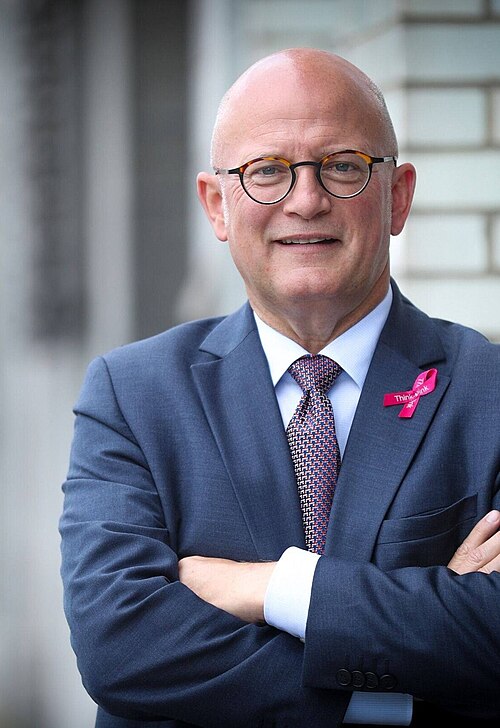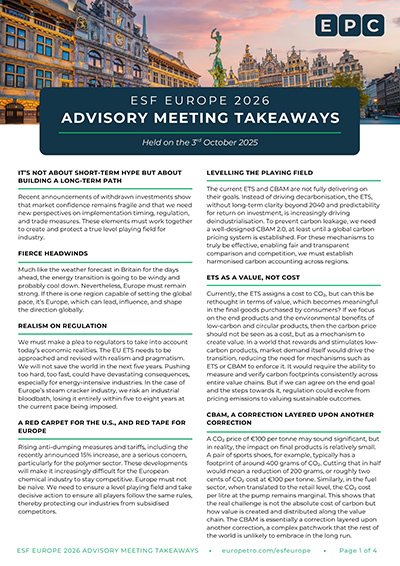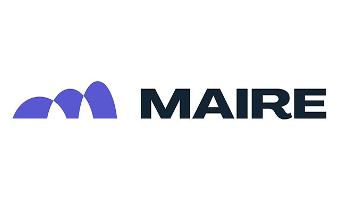24–27 February 2026
Antwerp, Belgium
ENERGY & SUSTAINABILITY FORUM24–27 February 2026
Decarbonising the Downstream Industry
I'm Interested in ESF Europe 2027Welcome to ESF Europe 2026
Decarbonising Europe’s downstream industries is a cornerstone of the broader clean industrial transformation. Over recent weeks and months, industry headlines have been dominated by a wave of plant closures and project abandonments, driven by weak demand, mounting competitiveness concerns, and shifting legislation.
With Europe’s refining and chemicals industries under increasing strain, it is now more critical than ever for the sector to unite in strengthening global competitiveness, revitalising operations and accelerating investment in innovation and sustainability.
From 24–27 February 2026, we will gather industry leaders, policymakers, and innovators in Antwerp - the birthplace of the Antwerp Declaration. As one of Europe’s key industrial hubs, Antwerp is an ideal location to advance the discussion on the critical role of refining and chemicals in the global energy transition and in shaping a competitive, sustainable, and secure industrial future in which Europe’s downstream industries survive and thrive!
Confirmed Presence
Jean-Luc Crucke
ROYAUME DE BELGIQUE
Federal Minister for Mobility, Climate and Environmental Transition, in charge of Sustainable Development


27th February
Port of Antwerp-Bruges Tour
Discover the beating heart of Europe’s chemical hub on a Port of Antwerp-Bruges port tour through the vibrant Antwerp chemical cluster.
Tour Details
2026 Pre-Conference Seminars
Building Resilience in Times of Uncertainty
Tuesday, 24th
February 2026,
09:00–12:00 CET
 More Details
More Details
Unlocking
Opportunities:
Supporting Resilience & Adaptability in Europe’s Energy Sector
Tuesday, 24th
February 2026,
13:00–16:00 CET
 More
Details
More
Details
Complimentary registration to the seminars is open to all refiners, and (petro)chemical producers.

2026 Advisory Meeting Key Takeaways
Meeting held on the 3rd October 2025
Europe’s refining and chemical industries are sounding the alarm.
During our ESF Europe Advisory Meeting, leaders issued a stark warning: the sector is nearing tipping point.
Download the key takeaways and learn what’s holding Europe back:
Read NowWhat a week in Wien!
A big thank you to:
- Co-hosts OMV for the best hospitality, and welcome to Vienna. It's been great collaborating.
- All of our sponsors for trusting, investing, and supporting the development of a sustainable energy future in which the refining and chemicals industries continue to play a leading role.
- All of our speakers and panellists for your thought leadership, insights, perspectives, and curiosities.
- And last but not least, everyone who joined us in Vienna and contributed to the growth and success of the event.
Registered Delegates
Countries
Pre-arranged
1-to-1 Meetings
Speakers & Panellists
Seminars
Networking Mixers

2025 Post-Show Report
25–28th February 2025 | Vienna, AustriaA comprehensive report of all the lessons learned during the event
Download Now2025 Co-Host Sponsor Exclusive Interview
Andreas Leitner, OMV Senior Vice President for Innovation & Technology, gives an insightful interview and outlines the company's ambitious innovation strategy to drive its sustainability transformation.

To transform, we
innovate,
and to innovate, we collaborate
Interview with
Andreas Leitner,
OMV Senior Vice President for Innovation & Technology
Innovation is paramount as OMV’s business model transitions to become an integrated sustainable chemicals, fuels and energy company, with plans to be CO2-neutral by 2050.
Read the InterviewESF Interview Series
Testimonials
Thank you very much for inviting me to ESF. For me it is one of the most important conferences. I don't think this event should be missed.
Manager, Production Process Optimisation Department, Orlen S.A.
Very much enjoyed the session. Like the engagement and alignment on call for urgency and industry leadership. Shout out to EPC for the excellent preparation.
VP Sustainability, Chevron Phillips Chemical
A great event, meetings with many interesting people, establishing new contacts, expanding knowledge of what is happening in the context of decarbonization and achieving zero emissions by 2050.
Business Analyst, MET DEVELOPMENT SPA
Great forum and meaningful open discussions.
Vice President Ethylene Business Group, Lummus Technology
What a great pleasure it has been to join this year’s Energy & Sustainability Forum, in Amsterdam, bringing together different stakeholders for the common target of decarbonising the Oil and Gas Downstream industry. It was amazing hearing about how it is our own responsibility across the whole industry to come together in deploying every possible measure to tackle GHG emissions, starting from energy efficiency and digitalization of current assets. Sustainable fuels, circular economy and carbon abatement measures via CCUS were definitely among the most debated topics, with SAF being really at the centre of the stage. Thanks to the Euro Petroleum Consultants for the amazing organization of this event!
Strategy & Market Analyst, Saipem
Other ESF Events
Media & Association Partners
Contact the Organisers
+44 207 357 8394 kay_mitchell@europetro.com

























